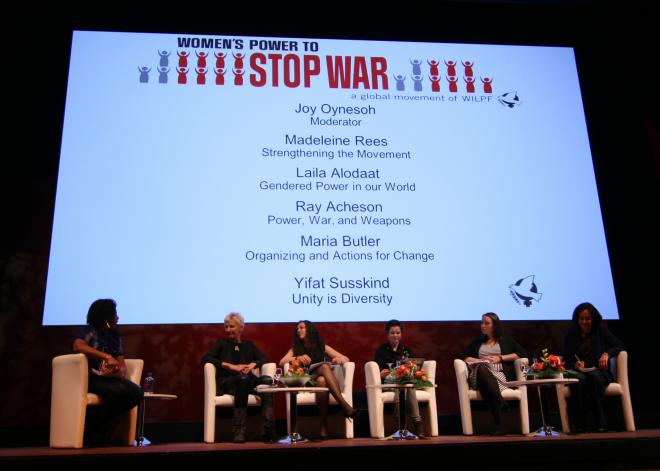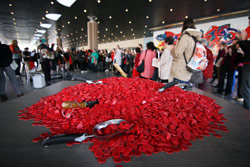Women’s Power to Stop War
Published on May, 00 2015
Anne Hoiberg, San Diego WILPF
Congress delegates and participants in 100th anniversary celebration in The Hague called on countries to reduce military spending by 10% and shift the funds to education as a specific step toward world peace.
During April 27–29, more than 900 women from 80 countries met at The Hague to celebrate the 100th anniversary of the Women’s International League for Peace and Freedom and to use their power to stop war. In 1915, WILPF’s founding mothers braved underwater mines and submarines to join more than 1,200 women from other countries for a Congress in The Hague to protest WWI and to seek ways to create permanent peace. During both gatherings in The Hague, 100 years apart, women came together to demand peace in the world and to reject the bomb and the bullet.
As one of the 900 women, I enjoyed a week of meetings where we discussed the root causes of war, the challenges to peace, and the means to create a permanent peace. The obstacles to overcome include militarism, masculinities, patriarchy, war-profiteering, capitalism, and a culture of violence. An important recommendation centered on the demand to reduce spending on the military by 10% in all countries and shift those funds to education.
 Global military expenditure reached $1.776 trillion in 2014, with the US the largest military spender at nearly three times the level of second-placed China ($610 billion versus an estimated $216 billion). Other countries in the top ten in military spending include Russia, Saudi Arabia, France, UK, India, Germany, Japan and South Korea. The top exporters of major weapons in 2014 are the US, Russia, China, Germany and France, representing 74 percent of all arms exports.
Global military expenditure reached $1.776 trillion in 2014, with the US the largest military spender at nearly three times the level of second-placed China ($610 billion versus an estimated $216 billion). Other countries in the top ten in military spending include Russia, Saudi Arabia, France, UK, India, Germany, Japan and South Korea. The top exporters of major weapons in 2014 are the US, Russia, China, Germany and France, representing 74 percent of all arms exports.
Another important recommendation promoted the banning of nuclear weapons, explosive weapons (bombs, rockets, landmines, cluster bombs), and autonomous weapons (killer drones). An urgent push for disarmament and protection of humans from nuclear test sites and submarines also was demanded.
Other crucial resolutions were endorsed as were the resolutions adopted in 1915. The ending of war is up to women. Women’s power can stop war.
PHOTOS by
Top: . Bottom: Participants moved poker chips representing money spent on the military to piles representing education and other human needs.



